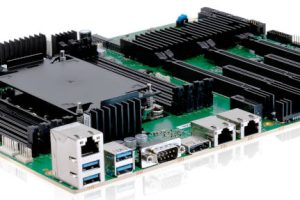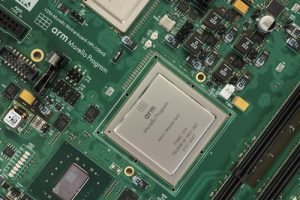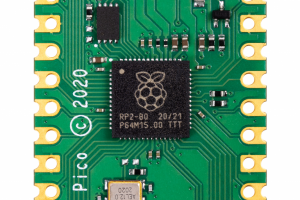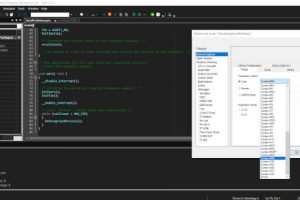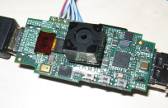
“In 1996, the average skill set of someone entering university was a couple of machine code languages and some hardware hacking experience. Now if we have someone that has written a web page we are lucky,” former University of Cambridge lecture Dr Eben Upton told Electronics Weekly.
Upton now works for a high-tech company in the same area and employs graduates:
“There are still bright kids around, but you have to find a general purpose smart person who would otherwise work for a bank, and then train them from scratch as an engineer,” he said.
Upton and five others have decided to do something about it – get them young.
“We all had that sinking feeling, that you look at any trend going in to the skills pipeline the numbers don’t look great,” he said. “Most of the factors, we can’t do anything about, so we did the one thing we could do something about and made a machine that is cheap and programmable. If someone has been programming since they were eight, they have experience baked in.”
The inspiration for Raspberry Pi comes from the pre-PC computers of the 80s, which encouraged people to programme, even when they didn’t know they wanted to.
“There is an energy barrier at the start of the learning curve,” said Upton. With the Spectrum or the BBC micro, even if you only wanted it to run a game, you turned it on and it immediately said ‘BASIC’ and you could write
>10 print “Hello world”
>20 goto 10.
A lot of us got sucked in by that and became programmers.”
PCs just don’t cut the mustard.
“Machines now start up in Windows and if you want to programme you have to go and get some tools, which you have to know how to look for,” he explained. “Its not trivial, and if its not trivial, 99% of people won’t do it
The result is a 32-bit ARM11-based computer than needs no supporting PC.
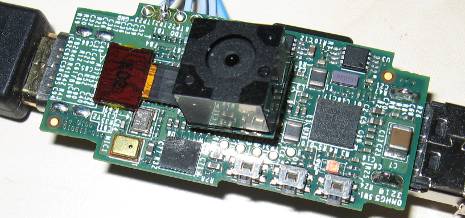 The size of a USB stick, it has an HDMI connector on one end for the TV, a USB connector at the other end for the keyboard, and it boots immediately into Linux running a scripting language.
The size of a USB stick, it has an HDMI connector on one end for the TV, a USB connector at the other end for the keyboard, and it boots immediately into Linux running a scripting language.
“The ‘Hello world’ programme is the same as BASIC, and it is immensely powerful underneath,” said Upton
How powerful?
“I have received 3,000 emails since we announced Raspberry Pi and I had responded to some of them individually,” he said. “I searched for the ones I had not responded to, and sent them a standard reply, all using 10 lines of Python code.”
Python is the favoured scripting language.
“It is the least annoying scripting language, a reasonably clean scripting language that is widely supported,” said Upton.
The provisional hardware specification is: 700MHz ARM11 with 256Mbyte SDRAM and a SD/MMC/SDIO card slot, plus general-purpose I/O pins.
It supports OpenGL ES 2.0 and 1080p30 H.264 decode, plus composite video out alongside the HDMI.
“The ARM11 is tiny and very very powerful – Pretty punchy by the standard of any pre-2003 PC,” said Upton.
Prototype hardware is finished and all the software needed underneath Linux is working.
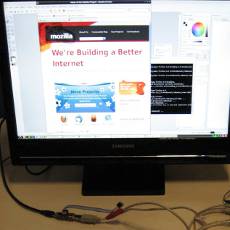 Ubuntu, Python, Iceweasel and KOffice are amongst the open source applications that have been run.
Ubuntu, Python, Iceweasel and KOffice are amongst the open source applications that have been run.
“Basically, you can download Ubuntu off the Internet and it runs on the board. The drivers are all done,” said Upton.
The hardware should cost around £15 and the founding six have put their hands in their pockets to start an educational charity called the Raspberry Pi Foundation that will develop, manufacture and distribute the computer.
Its mission is: “To promote the study of computer science and related topics, especially at school level, and to put the fun back into learning computing”, said the Foundation.
“The Foundation will be the vehicle for making the device and doing some stuff with the device, like running contests for the kids, with maybe a prize every week for the best application.”
A surprise
A significant proportion of those 3,000 emails have been from educators in less developed countries where PCs are rare but there are TVs.
“I have been quite surprised with what people want to do with the device,” said Upton.” A lot of people from the developing world want them: One from Uganda said can he have 100 of them, and a person in Peru said we want to outfit a school district with them and where do we send my money.”
The Foundation will be self-funding if it can sell 10,000 computers at the target price, estimated Upton.
“By the look of my inbox, if I had 10,000 here today and people to pack them, I would have none left tomorrow,” he said.
Why not just adopt Arduino?
“Arduino is great if you already know how to programme and you have a desktop PC,” said Upton. “It has better I/O than ours, and it is really attractive and cheap if you are a hobbyist and can build it yourself, but it has an 8 bit processor and is not very powerful.”
The Raspberry Pi developers and trustees of its Foundation are:
David Braben – Founder of games software firm Frontier Developments and co-author of ‘Elite’.
Jack Lang – Business angel, early Acorn employee, founder of Cambridge start-ups.
Pete Lomas – Founder and MD of Norcott Technologies.
Robert Mullins – Engineer at Broadcom Europe, director of computer science at St. John’s College, Cambridge.
Alan Mycroft – Professor of Computing in University of Cambridge Computer Laboratory
Eben Upton – Engineer at Broadcom Europe, founder of software start-ups, and former director of computer science at St. John’s College, Cambridge.
 Electronics Weekly Electronics Design & Components Tech News
Electronics Weekly Electronics Design & Components Tech News
